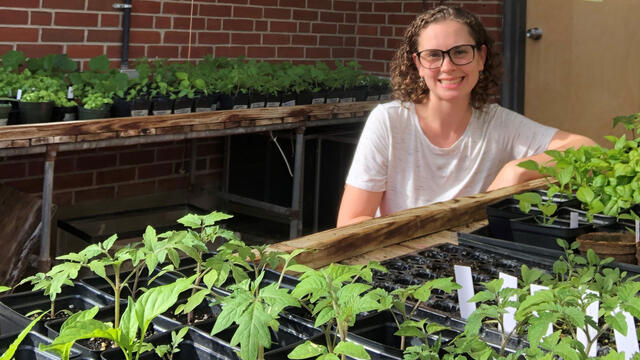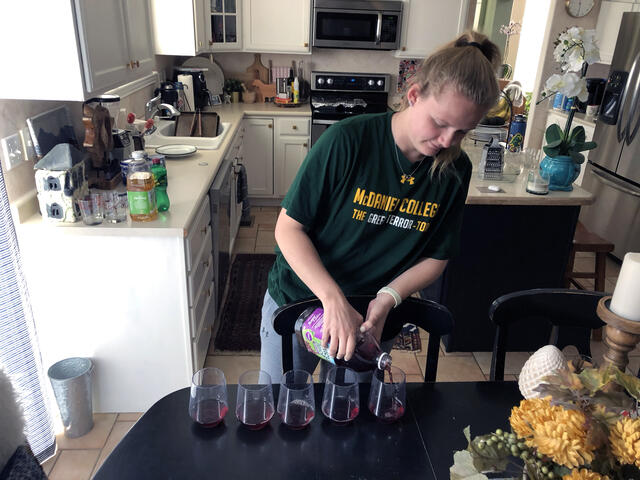Faculty ingenuity fuels McDaniel’s shift to online classes to weather the pandemic
McDaniel professors and instructional design staff pivot, using innovation and creativity, to transform classes, labs and studios for students to attend classes on a virtual Hill. Ingenuity abounds as students search homes and backyards for organic chemicals, act out scenes in plays on split screens, sample French culture by making crêpes and watch their seedlings grow in the college greenhouse via videos sent by their Sustainable Agriculture professor.

Environmental Studies professor Elly Engle tends the seedlings her Sustainable Agriculture students planted at the beginning of the semester and sends videos so her students can see how their sprouts are doing.
Innovation and creativity are leading the way as McDaniel students, in the wake of COVID-19, engage, connect and learn on a virtual Hill. Professors and instructional design staff have shifted classes, labs and studios to online, empowered as always by the college’s students-first mission.
With their kitchen counters serving as lab benches, instructor Michael Polen’s general chemistry students dive into their scheduled acid/base lab -- using grape juice, blueberries and red cabbage in place of the pH indicators they left behind in Eaton Hall.
Art professor Chloe Irla’s New Media Art students send weekly reports from home via videos that often include pets, parents and siblings in starring Tik Tok roles. Cats and dogs make frequent appearances too in English professor Kate Dobson’s memoir and rhetoric classes – so much so that one day the assignment was to post pet photos in VoiceThread.
Junior Biology major Sydney Kelly hunts ketones and aldehydes in her organic chemistry lab backyard safari.
Most mornings, Environmental Studies professor Elly Engle heads from her home on the college’s Singleton-Mathews farm to the greenhouse on the second floor of Lewis to water, weed and take videos of vegetable seedlings so her Sustainable Agriculture students can enjoy what’s sprouting from the seeds they planted before spring break.
Chemistry professor Dana Ferraris marvels at his organic chemistry students talents in videos of their search for aldehydes and ketones – noting their organic chemical structure -- in bananas, shampoo, peppers, perfume and other household items.
And those lucky Culture of France students and their families literally got a taste of French cuisine when their professor, native Parisian Martine Motard-Noar, sent them her family’s crêpes recipe to prepare.
“I wanted to give them an assignment that would help lower their stress level, do something that would probably be appreciated by the whole family and bring a bit of humanity and closeness at this tough time,” says Motard-Noar. “And, of course, there’s nothing quite like the flavors of France.”
Across all the disciplines, more than 523 undergraduate classes and labs have shifted to online. McDaniel’s professors are using Teams, VoiceThread, Zoom and their own resourcefulness to keep their students engaged and learning, according to Alissa Harrington, senior instructional design specialist at the college.
“Teams is our synchronous live meeting and chat tool,” says Harrington, who saw 40 Teams jump to 460 Teams in use at McDaniel when classes went online. “Teams recordings are shared instantly with every student in the class team, making it easy for faculty to distribute lectures to students who could not attend the online meeting.”

Crêpes made by Jack Buckley of Marshfield, Mass., for Culture of France class.
Some students have challenges such as sharing a computer with parents and siblings that make synchronous learning difficult. This is where VoiceThread comes in, allowing students to work on their own time.
“VoiceThread is asynchronous, yet creates a feeling of presence for the students and faculty due to its media-based platform,” says Harrington. “Students comment using video or audio and VoiceThread even includes a phone in your comment option for those who do not have a webcam.”
Eager for interaction and some semblance of McDaniel’s community vibe, students get together virtually in classes and also for study sessions and group projects.
“I am so inspired to see my students leaving VoiceThread messages, asking each other to hang out for study sessions, wanting to be ‘in class’ and participate in discussions,” says Dobson of her memoir and rhetoric students. “I think they are so eager for engagement that their VoiceThread comments are quite polished and complete.
“My students like and support each other, and they miss their home on the hill, so I’m not doing everything asynchronously.”
Engle has been live-streaming her Environmental Science lectures at the usual class time for students who are looking for some normal structure in their lives as well as recording them for those who want to watch later.
“It’s been great to maintain that connection. About 80 percent or more of my students have been showing up for the live-stream, and we use the Teams chat function to ask and answer questions,” Engle says of her Sustainable Agriculture and Society and Natural Resources classes.
One of the assignments in Irla’s New Media Art class was a book about the intersection of art, computer science and technology and how artistic approaches seep into fields such as medicine.

Annalise Bell, a junior Kinesiology major from Highlands Ranch, Colo., uses grape juice to test acids and bases at home.
“Reading this book proved to be a blessing in disguise. When I found out we were transitioning to an online class, I decided to redesign the remainder of the class to get students to make projects about how they would approach issues related to COVID 19,” she says. “My students also turn in a weekly report from home – this way we can still connect while maintaining an asynchronous and independently motivated schedule.”
Science labs offer their own set of challenges but none insurmountable if mixed with a bit of imagination. In addition to substituting household products for laboratory chemicals, Polen is using Virtual Lab, an online lab tool developed by his Ph.D. alma mater, Carnegie Mellon University.
“My students this semester will be using a virtual lab bench to perform their own titrations on their home computers,” Polen says. “This topic is not one my students would be able to see for themselves at home without this incredible resource. It gives them as realistic a simulation of the laboratory as is available currently.”
The liberal arts spirit thrives on McDaniel’s temporarily virtual campus, but it is not replacement for the residential model, which earned the college its impressive rankings.
Still, until COVID-19 is in the history books, learning continues online. Pairs of Acting students perform their scenes on a split screen from their homes in opposite corners of the country. Biology seniors present their capstones virtually to classmates gathered on Teams.
Jewelry making, American Sign Language, piano lessons, Earth Week celebrations and more – for now, cyberspace is the next best thing to being home on the Hill.
